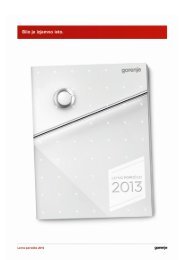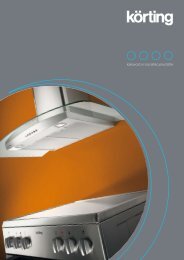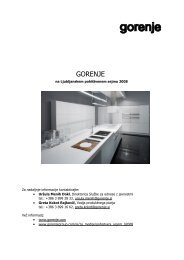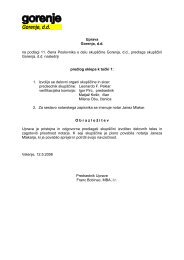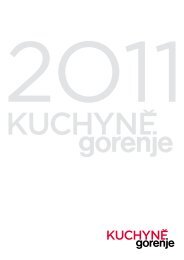Annual Report Gorenje Group 2009
Annual Report Gorenje Group 2009
Annual Report Gorenje Group 2009
Create successful ePaper yourself
Turn your PDF publications into a flip-book with our unique Google optimized e-Paper software.
(iii) Onerous contracts<br />
A provision for onerous contracts is recognised when the expected benefits to be derived by the<br />
Company from a contract are lower than the unavoidable cost of meeting its obligations under the<br />
contract. The provision is measured at the present value of the lower of the expected cost of<br />
terminating the contract and the expected net cost of continuing with the contract. Before a provision is<br />
established, the Company recognises any impairment loss on the assets associated with that contract.<br />
(iv) Provisions for retirement benefits and jubilee premiums<br />
In accordance with the statutory requirements, the collective agreement, and the internal regulations,<br />
the Company is to pay to its employees jubilee premiums and retirement benefits. For these<br />
obligations, long-term provisions are created. Other retirement obligations do not exist.<br />
Provisions are created by discounting, at the reporting date, the estimated future payments of<br />
retirement benefits and jubilee premiums. The obligation is calculated separately for each employee by<br />
estimating the costs of retirement benefits and the costs of all expected jubilee premiums until<br />
retirement. The selected annual discount rate is 5.40%, which is the rate of return on long-term<br />
entrepreneurial bonds in euro area. The calculation has been performed by a certified actuary using<br />
the projected unit method.<br />
l) Revenue<br />
(i) Revenue from the sale of products<br />
Revenue from the sale of products, merchandise and materials in the course of ordinary activities is<br />
measured at the fair value of the consideration received or receivable, net of returns, trade discounts<br />
and volume rebates. Revenue is recognised when the significant risks and rewards of ownership have<br />
been transferred to the buyer, recovery of the consideration is probable, the associated costs and<br />
possible return of goods can be estimated reliably, there is no continuing management involvement<br />
with the goods, and the amount of revenue can be measured reliably. If it is probable that discounts will<br />
be granted and the amount can be measured reliably, then the discount is recognised as a reduction of<br />
revenue as the sales are recognised.<br />
The transfer of risks and rewards varies depending on the individual terms of the contract of sale. For<br />
sales of goods, usually transfer occurs when the product is received at the customer's warehouse;<br />
however, for some international shipments transfer occurs upon loading the goods onto the relevant<br />
carrier.<br />
(ii) Revenue from services rendered<br />
Revenue from services rendered is recognised in profit or loss in proportion to the stage of completion<br />
of the transaction at the reporting date. The stage of completion is assessed by reference to surveys of<br />
work performed.<br />
(iii) Royalties (trademarks)<br />
Royalties are recognised in profit or loss in accordance with terms of the relevant agreement; the sale<br />
generated on individual geographical area is used as the basis.<br />
184<br />
<strong>Annual</strong> <strong>Report</strong> <strong>Gorenje</strong> <strong>Group</strong> <strong>2009</strong>



